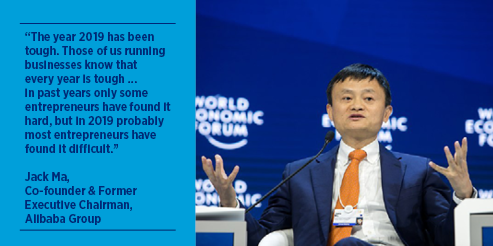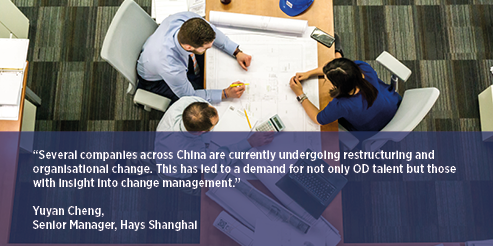The Inside Story of HR in China
The ongoing global economic slowdown contributed to 2019 being a year of uncertainty for many countries in the ASEAN region, shaking even the comparatively stable and developed economic landscape of China. A large section of this can be attributed to the US-China trade war that despite reaching phase one of an agreement in December, will still see tariffs remain on hundreds of billions of dollars’ worth of goods from both sides. Speaking to the South China Morning Post, founder of Alibaba Jack Ma commented that, “The year 2019 has been tough. Those of us running businesses know that every year is tough … in past years only some entrepreneurs have found it hard, but in 2019 probably most entrepreneurs have found it difficult.”
But despite difficulties, China’s economy has remained relatively stable and kept momentum by focusing on domestic growth. Additionally, the country’s relatively stable political landscape has given businesses the advantage of being able to plan for the long-term and invest in growth. When combined with the sheer size and relevance of its market in the global landscape, this has translated to both local and multinational companies being willing to invest significantly in securing top talent and growing their workforces quickly. This comes alongside a vibrant and innovative HR-tech landscape that falls in line with the country’s position as global leader in technologies.
These factors have contributed to a measured but steady growth for China’s HR labour market in 2020. With many organisations set to improve work culture and employer branding, the industry outlook remains positive but lends the advantage to candidates with specialised HR skill sets, data capabilities and experience in leading and implementing organisational change.

Market Overview: Cautious hiring as organisations restructure for change
“The ongoing economic slowdown has contributed to a quieter hiring market across China,” shares Yuyan Cheng, Senior Manager for Hays Shanghai. “Both organisations and clients are becoming more cautious when offering or seeking jobs, including within the HR function.” While some industrial sectors remain shaky, most of the current hiring demand is from the life science, high tech and consumer services sectors, she shares. Hiring is also concentrated within mid-senior level candidates whose roles are generally operational in nature, while hiring for junior level roles has been somewhat impacted by influx of HR-tech.
Both MNC’s and local companies with plans to expand overseas lead the demand for HRBP and Talent Acquisition specialists, as well as Talent Development (TD) and Organisation Development (OD) candidates who can help set up entire HR structures. As Yuyan explains, “Several companies across China are currently undergoing restructuring and organisational change. This has led to a demand for not only OD talent but those with insight into change management.”
Candidates with MNC backgrounds, solid local business knowledge and overseas experience are most preferred for such roles, which has led to a skills gap in the current HR talent pool in a relatively job short market. As Jane Zhang, Senior Manager for Hays Beijing shares, “Organisations are putting more time and effort to look for the right candidate as while there are a several candidates in the market, not many match the specialised skillsets they are looking for. Finding the right culture fit is also important for HR roles in particular, which can lead to jobs being kept open for even six months at a time.”
But despite a conservative outlook on hiring, compensation remains competitive for candidates that make the cut. Both MNCs and local companies are willing to pay premium for specialised and senior candidates, with listed companies even offering stock options, adds Ashley Ye, Senior Consultant at Hays Shanghai.
Skills in Demand: HR specialisation and data prowess
Organisations across China are raising standards when it comes to the academic qualifications of HR professionals, making it almost a requisite to have a bachelor’s degree, and ideally from an overseas location such as the U.S., U.K or Australia. The same standards are now applying to professional backgrounds as well, says Yuyan, “Previously, many HR professionals used to begin their careers as professional or executive assistants. But today, organisations prefer those who started in junior HR roles and moved their way up. The market is now becoming more specialist and particularly for HRBP roles, organisations prefer candidates who specialise in one or more HR functions (such as talent acquisition, training or compensation and benefits) and have basic know-how of others.”
The ability to collect and analyse data is also in high demand, which is most evident in local companies who are increasingly setting up ‘middle office’ functions to align front and back offices. As Jane explains, “Front office HR is more focused on daily interaction with the business, while the back office is more focused on data, systems and compliance or operations related tasks. Sometimes there can be a huge gap between both these functions, which has led to the creation of a middle office. Such roles require candidates who are more strategic and can collect data to analyse and implement methodologies that can positively impact the business.” Junior-mid level candidates are increasingly expected to have data prowess, including those in staffing, TA and HRBP roles, to help them have a full picture or map out candidate trends and predict future talent needs.

Business Acumen Increasingly Vital
Another increasingly common requirement is strong business acumen, as companies look to elevate HR from a support function to an advisory one. This is particularly the case for senior candidate, shares Yuyan, who need to, “understand business trends and who have operational experience but also a strategic mindset to plan ahead for the long term.” In addition to these, Jane shares that local companies are looking to hire senior candidates with, “practical experience in transforming an organisation or managing the merging of business units.” All of these requirements are underlined by strong communication skills, which are needed to advise both internal and external stakeholders.
Senior roles in demand include OD or TD senior managers, as well as senior TA managers and senior HRBP. OD and TD candidates are particularly hard to source in the market, as the majority of them come from consulting firms and often do not see the need or value to changeover to organisation-side roles. “Quite a lot of companies want to conduct organisational change or talent development to ensure they have strong talent pipeline. They want to hire people who can help change the business, but there is currently a mismatch in their expectations and the current talent pool,” shares Yuyan. The shortage is further exacerbated by the inability to hire senior candidates from overseas, owing to the extensive knowledge of local labour laws and climate that is needed for such roles.
Organisations ramp up employer branding and training
There has been an uptick in employer branding roles across China, as companies invest in highlighting their unique work cultures and build a reputation their employees would be proud of. This goes hand in hand with a growing demand for HR employees, especially junior ones, to have digital and social media skills to aid in these endeavours. A conducive work culture is becoming increasingly important to cater to staff from newer generations who prioritise chemistry with their hiring managers and teammates. However, hiring new employees always comes with risk, and YuYan advises organisations to invest more in their internal training to combat this. Candidates also highly value orientation training, as well as career development opportunities like training and tuition reimbursement. To cater to this, “some companies even sponsor high potential staff for 1-year MBA courses,” Yuyan shares.
Candidates are advised to develop their skills in tandem with business demands, if they are to stay relevant in an increasingly selective market. New technology will continue to impact HR roles, pushing candidates to hone and specialise their skill sets to continue adding value. Developing business acumen is another need of the hour, as the HR function continues to transform and gain visibility. As Yuyan signs off, “The future will see HR be put together with sales and commercial functions as the front of the business. For this, HR professionals will need to demonstrate their own commercial value and that they think as a business, for the business.”
Hays research
Hays Workforce Trends In 2024: Accountancy and Finance
China’s Technology Talent Trends for 2024
DNA series
